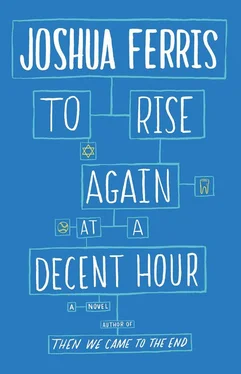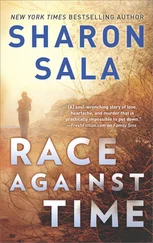“So it doesn’t matter,” he said to her calmly, “that I do this of my own free will, that I do it eagerly, that I do it lovingly, that I love nothing on earth as I do the Jews, that I am happier nowhere more than in shul, and that I came to Judaism because of its wisdom and beauty and swear to live by those things until my last day? And it doesn’t matter,” he continued, “that I want to bring more children into the world, more Jews, grandchildren for your father, who I will raise according to the custom and law of the Jews? I elect all of this, but you’re telling me in your father’s eyes it would be better for you to marry some Jew-by-the-numbers, so long as he was born a Jew?”
“Do you know the men he stands in front of during service?” she asked him. “Some of them just barely made it out of Europe before the Nazis marched in. One of them survived the camps. These are people who remember their villages being attacked just because they were Jews. My father came here from Kiev—”
“I know he came here from Kiev.”
“He saw things happen to his family — to his father, to his uncles. He was just a boy. You know the history, Grant, but they’ve lived it.”
“That shouldn’t disqualify me.”
“In the eyes of my father and the men of his congregation, it does.”
“And in your eyes?”
“In my eyes, no,” she said. “We’ll go to Israel. We’ll raise a family.”
“But lose the one you have?”
“What does it matter if we have our own?”
“No invitation to your house,” he said. “No Shabbat. No Seders. No holidays with your aunts and uncles. No place for me at Shalom B’nai Israel.”
“I know him,” she said. “He won’t allow it.”
“What’s it all been for, then,” he asked, “if we don’t have that?”
She wasn’t at all sure what he meant, and it confused her. Was he worried about her losing her family, or about it being lost, somehow, to him? But how could he lose something he never had? Aside from two complicit cousins, he’d never met any of them.
Then one afternoon Rabbi Mendelsohn appeared outside the house on the corner, rang the bell, and asked to see his daughter.
Despite the time they had had to prepare for the confrontation, neither of them was ready. Her father asked Mirav to introduce him to the young man who’d answered the door. Then he asked the young man if his parents were at home.
“My parents live in New York, sir,” he said.
“You live here alone?”
He nodded.
“Would you be kind enough to invite me in?”
“Of course.”
Osher Mendelsohn stood in the foyer and complimented the boy on the house. He gave no indication of what he thought of its spare interior or of the Chagall that hung conspicuously from the living room wall. They watched silently as he peered into the room with the fireplace, at the beanbag and the books on the floor.
“Do you mind if we sit down?” asked the rabbi.
“Only the two of us, sir? Or Mirav as well?”
“Would you care to join us, young lady?”
“If you want me to, Papa.”
“Yes,” he said. “I think you should.”
They had a seat at the new dining room table while Grant Arthur raced off to the kitchen. He wanted to offer the rabbi a variety of things to drink. If he knew anything as intimately as Mirav knew the traditional women’s prayer at candle lighting, it was how to host a party. That was his inheritance, the legacy given him by his parents. But there was only a little milk in the fridge. So he left the house through the back door and ran down to the grocery that belonged to the rabbi’s wife’s brother, where he bought three kinds of juice, two kinds of soda, and tea and coffee. But on his run home he found that the back gate had fallen shut, locking him out, and he had to enter through the front door, to the surprise of Mirav and her father, who were sitting in silence, waiting for him to return from the kitchen. He excused himself once more, unpacked the groceries, and returned to the doorway to ask what they would have to drink. Mirav wanted nothing, and her father asked only for a glass of water.
“I understand,” the rabbi began, after Grant Arthur had settled down at the head of the table he had purchased for his family, the rabbi to the right of him, Mirav to his left, “that you know Rabbi Youklus of Anshe Emes.”
“Yes, sir.”
“Rabbi Youklus tells me that you want to be a Jew.”
“Yes, sir, I do.”
“A very bright young man, says Rabbi Youklus. Maybe even a genius. He was very impressed by you.”
“I have devoted myself day and night to the study of Judaism, sir. I plan to continue to do so. I hope to live up to the Jewish scholars I admire the most. Rabbi Akiva, Spinoza.”
“A noble thing.”
“I’ve learned some Hebrew, and I study Torah at least six hours a day. And my favorite poet is Heinrich Heine. He wasn’t a good Jew, but he wrote lovely verses.”
“I also understand,” said the rabbi, “that you have legally changed your name, is that correct? I believe Rabbi Blomberg of Yad Avraham told me that.”
“I’m in the process of doing so right now, Rabbi Mendelsohn.”
“And who are you studying with now?”
“Rabbi Rotblatt, sir. Of Temple Israel.”
“Oh, yes, that’s right. Rabbi Rotblatt, who tells me that you wish to go to seminary after your conversion is complete.”
“Yes, sir, I do. I hope to be a rabbi,” he said, “like yourself.”
“A noble thing,” repeated the rabbi. He took a sip of his water and placed the glass back on the table. “This is a very nice table,” he said, pausing a moment to admire it.
“Thank you, sir.”
“And the painting on your wall, that is a fine reproduction.”
“Oh, that isn’t a reproduction, sir.”
The rabbi lingered on it before withdrawing his eyes.
“Do you wish to marry my daughter?” he asked.
“Yes, sir. I do.”
“I wonder,” he said, “if you would mind me asking you a question or two about your studies — not to interrogate you, I hope you understand. We are in your house, and I have no wish to be rude to you in your own home. I only want to know a little of what you know, considering that you would like to join my family.”
“You may ask me anything,” he said.
“Do you know what a Seder is?”
“The Seder is the major ritual of Pesah, or Passover, when we commemorate the Exodus from Egypt and mark the start of the covenant between God and the Jewish people.”
“Have you been to a Seder?”
“I should also add that the word ‘Seder’ means ‘order,’ and this order, or ritual, is to be found in the Haggadah, or ‘telling.’ I have only been to one Seder, sir, at the invitation of Rabbi Greenberg, and it was a transformative experience.”
“Rabbi Greenberg?”
“Of Temple Sinai, in Long Beach.”
“Rabbi Greenberg I don’t know,” said the rabbi.
“He was kind enough to invite me to my first Seder,” he said. “I wish I could convey to you even a portion of what it meant to me.”
“And may I ask you about the holiday of Shavuot, and what, if anything, it means to you?”
“Shavuot marks the end of the Counting of Omer, which begins at the end of Passover and lasts for seven weeks. It commemorates the Revelation at Sinai, when God bestowed the miracle of the Torah upon the Jewish people and marked them forever as His Chosen Ones. I participated in an overnight study session during Shavuot this year. It was meant to demonstrate our love and embrace of Torah, and was one of the most moving experiences of my life.”
“Was that also with Rabbi Greenberg?”
“No, sir,” he said. “That was with Rabbi Maddox.”
Читать дальше












